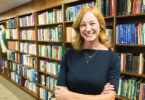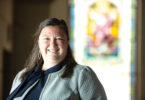
by Deacon Leon Suprenant
The church teaches that all Christians not only participate in Christ’s priestly office, but also in his prophetic and kingly (or royal) offices. As Scripture teaches, we are a “royal priesthood” (1 Pt 2:9).
So how do we understand our participation in the kingly office of Christ?
The mother of James and John wondered about that herself, as she pointedly said to Jesus, “Command that these two sons of mine sit, one at your right and the other at your left, in your kingdom” (Mt 20:21).
However, Jesus patiently explained that in his kingdom, royal authority is not about secular power, but about service (“diakonia”). Jesus concludes by saying, “The Son of Man did not come to be served but to serve and to give his life as a ransom for many” (Mt 20:28).
This clearly is not what most people usually think of when they envision “kingship”!
This call to serve rather than be served, to find Jesus in the poor and to wash the feet of others are things that pertain to all the baptized, but are lived out in a special way by deacons.
What makes a deacon different? Sometimes, the distinctiveness of deacons as compared to what we might call the “diaconate of the laity” seems unclear. There are no readily identifiable “superpowers” attached to being ordained as a deacon.
Yes, there are many images that point to aspects of the deacon’s mysterious configuration to Christ the Servant. “Servant on the move,” “waiter,” “herald,” “envoy of the bishop” and many other images point to important aspects of this reality.
One image that really strikes me builds on Pope Francis’ image of the church as a field hospital. As I consider that image, I imagine the laity as soldiers out on the battlefield, and the priests and bishops back in the field hospitals, acting in the person of Christ the divine physician, in treating the wounds of sin with the sacraments.
Where does that leave the deacon? In this image, I see him as the medic. He’s on the battlefield shoulder to shoulder with the soldiers, and the bullets are flying over his head. He’s trained to do some triage, but his mission is to get the wounded to the hospital and then quickly get back to the battlefield for the others. Of course, other soldiers assist their fallen comrades, but only the medic has this specific office to move back and forth between the world of the soldier and the world of the physician.
At the service of communion, and with a preferential love for the poor — or in the above image, the wounded —the deacon is a tangible sign of Christ’s “diakonia” in the world.






